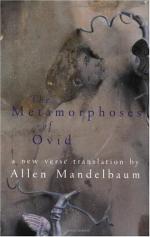|
This section contains 7,988 words (approx. 27 pages at 300 words per page) |

|
SOURCE: Heath, John. “The Stupor of Orpheus: Ovid's Metamorphosis 10.64-71.” The Classical Journal 91, no. 4 (April-May 1996): 353-70.
In the following essay, Heath argues that in the Metamorphoses Ovid sees Orpheus' failure to recover Euridyce from death as an indication of the inadequacy of art given human weakness.
Charles Segal has written recently that “the line between the cynical, parodistic Ovid and the humanely sensitive Ovid will probably never be definitively drawn because both Ovids exist in the Metamorphoses.”1 As he notes, this is particularly the case with the Orpheus episode (Met. 10.1-11.66), for the failure of this archetypal poet/prophet to bring his wife back from the underworld can be read with either sympathy or derision. Segal himself, in 1972, had concluded that the bard is “victorious as both a poet and a lover. Orpheus vindicates the two realms that for Ovid form the surest and finest basis for human...
|
This section contains 7,988 words (approx. 27 pages at 300 words per page) |

|


